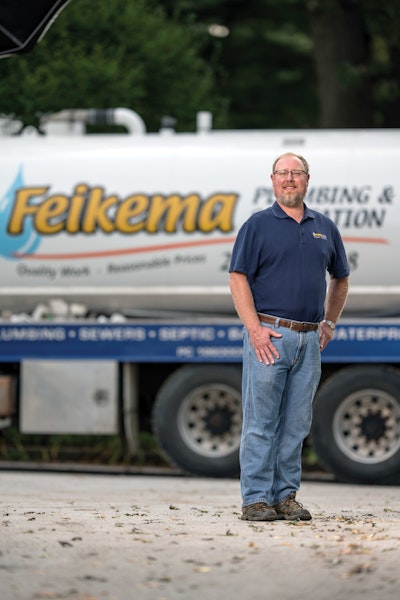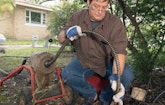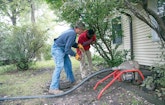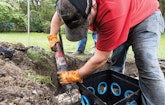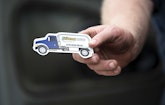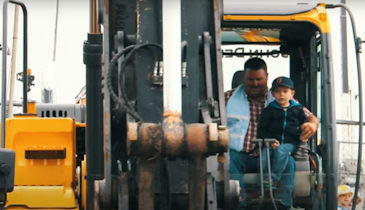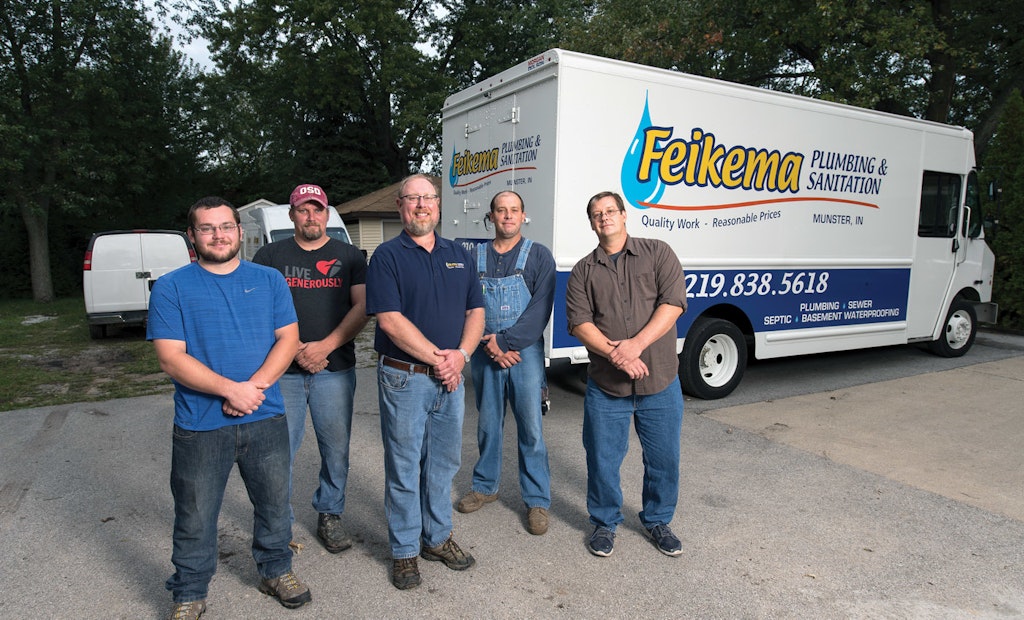
The Feikema Plumbing & Sanitation team includes (from left) Chris Burrell, Rob Hamstra, Dirk Feikema, Kyle Arnold and David Buckmaster.
Some plumbers don’t want anything to do with drain cleaning beyond the occasional clogged kitchen sink or bathtub. Then there are plumbers like Dirk Feikema, who’ve made drain cleaning — ranging from smaller jobs to stopped-up sewer lines — a staple of their service offerings.
Sure, there are additional costs involved when entering new markets. And yes, sewer jobs literally stink. But the owner of Feikema Plumbing & Sanitation in Munster, Indiana, says that given the profit margins and high demand for such work, it’s hard to justify not doing it — especially if it means giving away the business and revenue to a subcontractor. Moreover, larger drain-cleaning jobs serve as a launch pad for other high-margin services, such as drainline inspections and pipe bursting to replace bad lines.
“I grew up doing it, so I never considered not doing it,” says Feikema, 50, the third-generation owner of the company. His grandfather, the late Peter Feikema, established the business in 1956 in Munster, located right by the Illinois/Indiana state line in the northwestern corner of the state. “I’ve been rodding sewer lines on my own ever since the day after my 16th birthday. I got my driver’s license and my dad put me to work doing sewers on my own.
“Now sewer lines are a huge part of how I stay in business,” adds Feikema, who says cleaning drains generates about 13 percent of his annual revenue. “It’s a case of one hand feeding the other. I get calls a couple times a week from different contractors who can’t get a sewer line open and believe it’s broken. Then I can come out and use a camera to locate the problem and give the customer an estimate to fix it, if need be.
“At the end of the day, drain cleaning is a serious part of my business,” he says, pointing out that he and two of his six technicians are dedicated primarily to drain cleaning work.
Business evolution
The company started out as Peter Feikema Excavation, which primarily focused on new residential construction work, fueled by a post-World War II building boom that drove demand for everything from digging basements to installing septic systems. After a few years, the elder Feikema and his son, Wesley Feikema, decided to pump out septic tanks, too, as well as branch out into installing waterlines, sewer lines and drain tiles.
Larger market forces nudged the company toward plumbing work, but it didn’t happen overnight. Over the years, as new-home construction gradually slowed in the northern half of Lake County where the company does most of its work, demand for excavation work declined. Meanwhile, demand for service-and-repair plumbing grew as the housing stock aged. As such, doing plumbing work locally made more sense than making longer drives to do new-home construction work, not to mention incurring the associated higher costs for fuel and vehicle maintenance and wear and tear, he says.
“We could’ve followed the new-construction world, but that would’ve meant working farther and farther away from our yard,” says Feikema, a master plumber. “Or we could focus on fixing our neighbors’ problems and stay 5 to 10 miles away from our yard. It was a no-brainer.”
Dirk Feikema started working for his father during summers after he graduated from eighth grade. He went to college with ambitions to be a teacher. But after he graduated from college in 1991 with a history degree from Calvin College in Michigan, he decided to work for his father.
At the time, the company already was dabbling in minor plumbing jobs, but Feikema felt it could be more valuable than just fill-in work. “So drain cleaning and service plumbing became my thing,” says Feikema, who started attending plumbing school. “I’d pump two septic tanks in the morning, and then do two or three drain cleanings in the afternoon. That’s how we went along for years.
“There was never any kind of master plan,” he says of the company’s gradual makeover. “It was just a go-where-God-leads-you kind of thing. I’m good at what I do, but I’m no strategic genius. Plumbing was just more my thing, while my father (Wesley Feikema, now retired) just loved to dig holes.”
Investing in equipment
Offering a variety of services requires an array of equipment. For drain cleaning, the company relies on almost a dozen RIDGID machines including a K-40 sink cable machine, K-50 and K-60 sectional drain machines, and a larger K-1500 drain machine; a cart-mounted water jetter made by General Pipe Cleaners/General Wire Spring; a Crap Shooter and Crap Shooter II, made by BullFrog Industries, for cleaning smaller drainlines; and a Kinetic Water Ram drain cleaner, made by General Pipe Cleaners/General Wire Spring. Feikema also owns two RIDGID SeeSnake pipeline inspection cameras, one SeeSnake Mini camera and a pipe bursting system manufactured by TT Technologies.
The plumbing end of the business relies on three service vehicles: a 2018 Ford F-59 step van with a 16-foot aluminum box body made by Morgan Olson, a 2004 GMC Savana extended-length cargo van and a 2017 Ford Transit van equipped with a storage system from Kargo Master.
“The Kargo Master cabinet (with three long drawers) is just about the best thing ever,” Feikema says. “It runs parallel to the bulkhead, so the drawers pull open to the side of the truck, which makes things very accessible.” The drawers are divided into compartments. Feikema says he uses the bottom drawer for storing tubular combinations for traps, the middle drawer for faucet parts and the top drawer for items such as wax rings, Fluidmaster toilet fill valves, expansion plugs and so forth. “It’s basically a horizontal filing cabinet that holds a ton of stuff.”
For power tools, Feikema prefers Milwaukee Tool products. The company also owns a ROTHENBERGER USA Ropress tool for joining copper fittings; a RIDGID pipe-sawing machine; and a leak-detection smoke machine made by the Superior Signal. “We might only do smoke-testing three or four times a year,” he says. “But that machine paid for itself after two jobs. And it has an electric motor, so it’s not like it’s going to go bad.”
Right-sized
Looking ahead, Feikema has no ambitions to dramatically increase the company’s size and scope. Once again, geography makes that an easy strategic decision. “Sizewise, I don’t want to grow any larger,” he says. “I’m at a comfortable level in terms of employees and equipment.
“In addition, I’m sort of limited by my geographic location in that we work out of a barn on a farm my family owns. When we started out, there was no town around us, but now we’re boxed in by neighbors, so I can’t expand my yard. And it makes no sense to move to another location to get more room. Again, would you rather do service calls a mile or 2 from your shop or, say, more than 30 miles from your shop? I’ve accepted the size-limitation factors.”
Down the road, Feikema may have to accept something else: The fact that there might not be a fourth generation taking over the family business. He has two children, a son and a daughter, ages 18 and 16, respectively. And neither of them appear to be interested in taking the reins.
“I don’t expect my son to come back,” Feikema says. “I’m trying to not put pressure on him to come back, either. If it happens, it happens — he has to choose his own life.
“But in the meantime, I would like to operate the business for another 10 years or so. And at the point, if there’s no heir apparent, I’ll have to look at selling the business.”
Feikema says closing up a longtime, family-owned business would be difficult. But finding a buyer he likes would help ease the pain. Either way, he has no regrets about the decision he made 30-some years ago to come back home and work for his father.
“It’s funny because when I was at high school, I used to get mad at my dad because he was such a workaholic,” he says. “And now I realize I work just as much as he did — it’s easy to work long hours when you take ownership of something.
“Ultimately, I feel lucky that I found something I’m good at and that allows me to help people with their problems. I’ve been successful enough at it to make a good living. It’s been very good for us.”
Creating customers for life
To Dirk Feikema, the essence of good customer service is not all that complicated: Be accessible. Operate with honesty and integrity. And make it easy for people to remember your company the next time they need service.
“A lot of it boils down to just caring for the customer,” says the third-generation owner of Feikema Plumbing & Sanitation in Munster, Indiana. “Most of my customers are pretty loyal to me because I take care of them. The key is providing timely service at a reasonable rate."
Accessibility is a key factor in that customer care. “For better or for worse, I answer the phone almost all the time,” he says. Office calls usually get transferred to his cellphone if no one is in the office. “That way, when customers call, I can give them an answer right away.”
The honesty component comes into play by not recommending unnecessary products and repairs. For example, Feikema says he could try harder to persuade customers to buy new fixtures and the like instead of making repairs — but he doesn’t. “I don’t put any pressure on my guys to try and upsell products, either,” he says.
In addition, Feikema says he strives to avoid overscheduling his technicians. That way if a customer wants to get a repair done that wasn’t expected, there’s still time to do it.
To make it easy for customers to remember his company, Feikema hands out refrigerator magnets designed to look like his vacuum truck. The magnets, made by Stamp Works Magnets in Texas, include the company’s contact information.
“People respond well to that,” he says. “It’s hard to quantify how it affects business. All I know is that when I go into customers’ kitchens to get paid, I usually still see the magnet on the fridge.”
